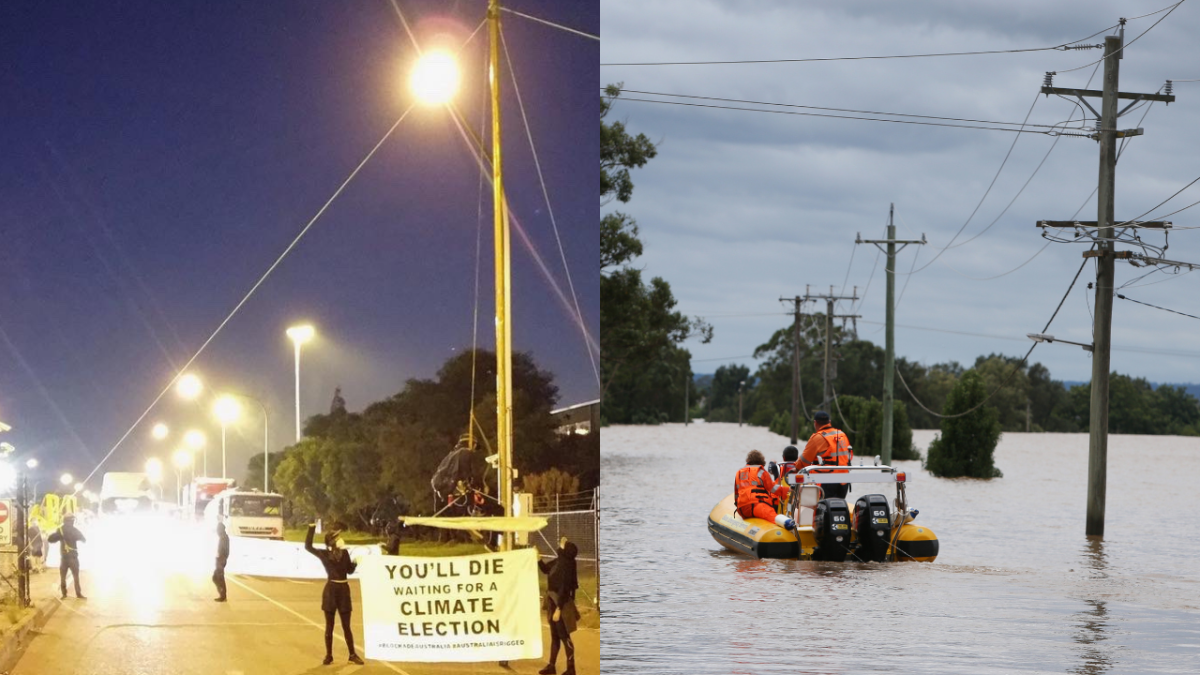
Blockade Australia climate activists protesting Australia’s fossil fuel industry at Sydney’s Port Botany this morning say the government response and media coverage of their direct action focused on everything but climate change.
Two activists blockaded the entrance to Port Botany in Sydney at about 6:20am on Tuesday and temporarily stopped goods from entering or leaving, which caused trucks to back up several kilometres.
The blockade was set up on Bumborah Point Road near the intersection of Friendship Road, which are mainly used by industrial and port workers.
One activist came down from their elevated structure made of bamboo and steel at about 7:30am while the second, identified as 23-year-old Tom, was removed via cherrypicker from atop a nine-metre pole by police and taken into custody at about 8am.
Media outlets covering the disruption including News.com.au, the Daily Telegraph and the Daily Mail referred to it as “traffic chaos,” “major delays for motorists trying to get to work,” and “grinding trucks to a standstill”.
But do you know what else disrupts traffic and impacts regular citizens? Floods. Bushfires. Climate change.
BREAKING: Today Henry blockaded the entrance to the Port of Botany, climbing a bamboo tensegrity structure to expose Australia’s system of exploitation & extraction that’s fueling climate collapse.
Stop Australia where it began! >> https://t.co/fenCWET9YW #BlockadeAustralia pic.twitter.com/jL13MKoTO7
— Blockade Australia (@BlockadeAus) March 21, 2022
Spokesman for Blockade Australia Greg Rolles told PEDESTRIAN.TV many media outlets were quick to accuse the climate activists of affecting average Aussies, as if climate change wasn’t already doing that tenfold.
“The media has been pretty interested in not trying to talk about climate change in my experience,” Rolles said.
“We’re talking about this because we’re in the middle of a climate crisis and we have to be talking about it and taking action on it, and the media want to talk about everything but.”
He said media coverage on Tuesday morning had accused them of hypocrisy by causing more emissions than stopped with their action.
Disruption to our lives is something we have to deal with as the climate crisis deepens.
“I’d say the media’s missing the point,” he said.
Port Botany is NSW’s biggest shipping container port. It ferries 98 per cent of the state’s LPG, 90 per cent of its bulk chemicals and 30 per cent of its petrol.
Blockade Australia, as the name suggests, is all about disruption to these industries.
The last time it drew mass media attention was in November 2021 when climate activists blocked coal trains and shut down machinery at world’s largest coal port located in Newcastle and brought it to a grinding halt for two weeks. It was estimated the disruption cost Australia’s coal export industry up to $60 million.
Its protests are non-violent and designed to hit the government where it hurts — its wallet.
“We’re not targeting roads here we’re targeting points of business,” Rolles said.
“Places where [Australia] makes its capital, makes its money from extraction from this continent, so if any traffic chaos is caused, what we’re actually trying to do is cost money to the projects that are driving us all into a very dangerous climate future.”
And it worked. NSW Transport Minister David Elliott was very mad and said on Tuesday this incident was “nothing short of economic vandalism”.
“Not only does this inconvenience a workforce which doesn’t deserve it, but it inhibits economic recovery as we come out of the pandemic and floods,” Elliott said, who also called the climate activists “selfish”.
Rolles responded and said it was selfish of the State Government to ignore climate change.
“In his very own state, the natural disasters we’ve seen here, it’s pretty selfish not to acknowledge that these are all symptoms of the climate crisis and we need to be acting on that as a priority,” he said.
“The floods were a symptom of the climate crisis that’s upon us all and that’s causing more economic disruption than anything.
“If we don’t draw attention to it or put pressure for change on this issue there’s going to be far more disruptions to average workers at the port and everywhere else.”



